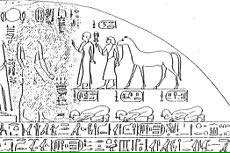 "In the three centuries following the collapse of the New Kingdom, Egypt fragmented to an unprecedented degree. By 730 BC, Upper Egypt south of Thebes was controlled by Piahkhi (747-716 BC), a Kushite pharaoh from Napata in far-off southern Nubia. To the north of Thebes, there were rival rulers of Hermopolis/el-Ashmunein (King Nimlot) and Herakleopolis (King Peftjauawybast), the latter at least nominally loyal to Piankhi. In lower Egypt , there was a king at Bubastis (Osorkon IV) and another at Leontopolis (Iuput II), while other towns were governed by a bewildering array of Chiefs of the Ma (the name of a prominent Libyan tribe that had infiltrated the Delta in the late New Kingdom and succeeding centuries), hereditary princes and mayors. Piankhi, who regarded himself as the sole legitimate pharaoh lumped them all together, somewhat contemptuously, as 'every feather-wearing chief of Lower Egypt.'
"This fractured state of affairs seems o have been tolerated until 728 BC, when one of the Great Chiefs of the Ma , Tefnakht of Sais, who already ruled the entire western side of the Delta threatened to upset the status quo by extending his writ southward, forging an alliance with King Nimlot and besieging Peftjauawybast at Herakleopolis. Piankhi first decided to send reinforcements to Egypt, but when they failed to stop the insurrection, he decided to invade Egypt himself. Motivated by his piety to the god Amun, Piankhi's invasion was as much a crusade as a land grab. He regarded the rebels as having strayed from the 'way of life' and was determined to restore the divinely ordained balance of power, enriching the endowment of Amun at Karnak with captured booty on the process .
"In the sequence of activities that followed , Piankhi besieged Hermopolis and took the surrender of Nimlot; rescued Peftjauwybast and received his homage; captured a series of fortified towns on the road to Egypt's capital city, Memphis, then stormed it; received the submission of various Delta rulers (with notable exception of Tefnakht); put down an opportunistic revolt; and finally accepted Tefnakht's own surrender , albeit delivered by an envoy. Laden with booty, Piankhi returned home to Nubia in triumph ."
P.64-65, "Piankhi Stela," WRITINGS FROM ANCIENT EGYPT (2016), translation by Toby Wilkinson.
"In the three centuries following the collapse of the New Kingdom, Egypt fragmented to an unprecedented degree. By 730 BC, Upper Egypt south of Thebes was controlled by Piahkhi (747-716 BC), a Kushite pharaoh from Napata in far-off southern Nubia. To the north of Thebes, there were rival rulers of Hermopolis/el-Ashmunein (King Nimlot) and Herakleopolis (King Peftjauawybast), the latter at least nominally loyal to Piankhi. In lower Egypt , there was a king at Bubastis (Osorkon IV) and another at Leontopolis (Iuput II), while other towns were governed by a bewildering array of Chiefs of the Ma (the name of a prominent Libyan tribe that had infiltrated the Delta in the late New Kingdom and succeeding centuries), hereditary princes and mayors. Piankhi, who regarded himself as the sole legitimate pharaoh lumped them all together, somewhat contemptuously, as 'every feather-wearing chief of Lower Egypt.'
"This fractured state of affairs seems o have been tolerated until 728 BC, when one of the Great Chiefs of the Ma , Tefnakht of Sais, who already ruled the entire western side of the Delta threatened to upset the status quo by extending his writ southward, forging an alliance with King Nimlot and besieging Peftjauawybast at Herakleopolis. Piankhi first decided to send reinforcements to Egypt, but when they failed to stop the insurrection, he decided to invade Egypt himself. Motivated by his piety to the god Amun, Piankhi's invasion was as much a crusade as a land grab. He regarded the rebels as having strayed from the 'way of life' and was determined to restore the divinely ordained balance of power, enriching the endowment of Amun at Karnak with captured booty on the process .
"In the sequence of activities that followed , Piankhi besieged Hermopolis and took the surrender of Nimlot; rescued Peftjauwybast and received his homage; captured a series of fortified towns on the road to Egypt's capital city, Memphis, then stormed it; received the submission of various Delta rulers (with notable exception of Tefnakht); put down an opportunistic revolt; and finally accepted Tefnakht's own surrender , albeit delivered by an envoy. Laden with booty, Piankhi returned home to Nubia in triumph ."
P.64-65, "Piankhi Stela," WRITINGS FROM ANCIENT EGYPT (2016), translation by Toby Wilkinson.
